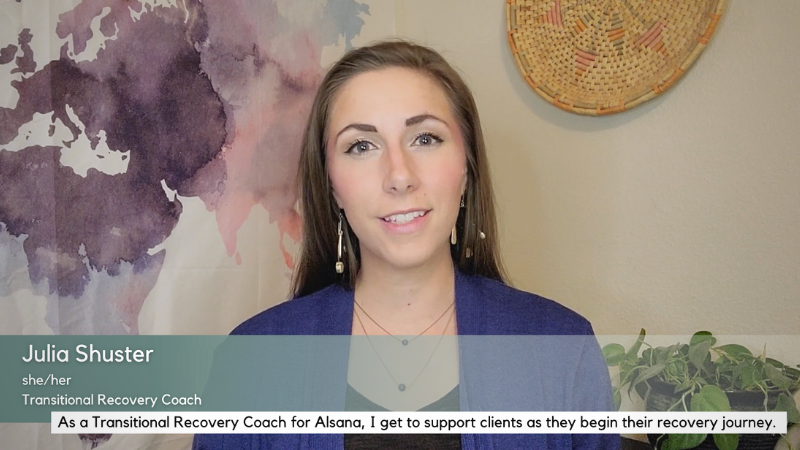Transitional Recovery Coaching Services
Alsana is pleased to offer complimentary 1:1 Transitional Recovery Coaching and other resources to support clients during the admissions process.
Compassionate support for the first brave steps of the eating recovery journey.
MOTIVATION and SUPPORT
The Transitional Recovery Coach’s primary objective is to assure each client that it’s ok to be scared and that help is available so they don’t have to navigate the admissions process alone.
- Compassionate 1:1 talk support via phone and video
- Develop coping strategies such as breathwork and mindfulness
- Safe, judgment-free space to process fears and ask questions
- Emphasis on shame reduction
ACCOUNTABILITY and PROCESS GUIDANCE
During the admissions process, some clients may benefit from and opt-in to receive additional support to help them follow through with pre-treatment milestones such as the clinical and medical assessments.
- Appointment reminders via text or phone
- In-transit support
- Educational downloads and letter templates
- Emphasis on self-advocacy
COMMUNITY CONNECTION
While eating disorders thrive in isolation, recovery happens in community. Our Transitional Recovery Coach welcomes clients into our eating recovery community and introduces them to resources that reinforce the message that no one has to struggle alone.
- Weekly support groups
- 1:1 coaching sessions for caregivers and other members of clients’ recovery support networks
- Educational blog content and testimonials to help light the way
- Emphasis on relational health
Clients may access these services at any time during the admissions process and while waiting to enter their treatment program. Chat now with Admissions to get get started.

Introducing "Transitional Recovery Coaching”
“Transitional Recovery Coaches provide compassionate support for eating disorders clients during the admissions process. This helps clients overcome eating disorders beliefs and commit to self-advocacy and the recovery journey…”

Meet Julia, Transitional Recovery Coach for Alsana



I’m here to help!
As someone who has been where you are now, I know how hard it can be just to navigate the admissions process while struggling with eating disorder thoughts and symptoms. That’s why I’m grateful for the opportunity to be of service and offer my support to you at this stage of your recovery journey.
If you need guidance, emotional support, or even just a listening ear at any point during the admissions process, you are not alone. Live Chat with an Admissions Counselor to request a meeting with me and I will be there for you. I believe in you.
Julia
✉ julia.shuster@alsana.com
Contact Us
We’re here to support you while you regain balance.
Steps to admission
A simple five step process to start your healing journey.
Step 1
Contact
Click on Get Started to provide your contact information or give our admissions team a call at (855) 915-0213. We’ll start the process by gathering some information, answering any questions you might have, and reviewing the next steps.
Step 2
Insurance Review
With your consent, our team will contact your health care insurance provider and obtain a quote of benefits. We’ll review this information with you so you can make an informed decision regarding your treatment options and understand what your insurance will cover.
Step 3
Clinical Assessment
Our assessment specialists are masters-level clinicians trained to gather important information on your eating disorder symptoms and any other symptoms or conditions you might have.
Step 4
Medical Clearance
A medical packet (PDF) will need to be completed along with lab work and screenings. This can be done with your primary care provider or at any urgent care or medical facility. Our medical and admissions nursing team will review your medical information to determine the appropriate level of care that will best meet your current needs.
Step 5
Admission
Following clinical and medical clearance, we will begin to schedule the admission. If you’re ready, we’ll select a date, help you coordinate travel arrangements, and connect you with the program director at the location where your recovery journey will begin.
Most commonly asked
questions
Our average length of stay is 30-45 days at RTC, 45-60 days in Day Treatment (PHP), and 45-60 days in Intensive Outpatient Treatment (IOP). Your length of stay is dependent on your clinical needs and preferences, clinical recommendations, and approval from your insurance provider (when applicable). Prior to returning home, we recommend that clients step down to lower levels of care within the program as to provide practice in a structured environment to support your long-term success.
In our experience, insurance companies will often pay for some or even most of eating disorder treatment. However, coverage plans vary, and it’s important to get an accurate statement of benefits from your insurance provider. Our admissions team will work closely with you and your insurance company to develop a good understanding of your insurance coverage. During your treatment stay you will be assigned a UtilizationReview Specialist who works closely with your insurance company to get your care authorized. Contact our admissions department and we will be happy to assist you in discussing benefits with your insurance company.
We accommodate vegetarianism at our facilities. Our culinary team provides creative vegetarian menu options daily. Our dietitians will work with you to develop a vegetarian meal plan that meets your nutritional needs. The entire treatment team will partner with you to explore if vegetarianism overlaps with your eating disorder and provide a safe and supportive environment to challenge any food beliefs that interfere with your recovery.
Alsana will work to meet you where you are if you follow a vegan meal plan upon admission. Although we cannot promise a fully-vegan kitchen, our culinary program uses minimal animal-based products, our vegetarian menu accommodates veganism, and our sauces and dressings are made from scratch. Your treatment team will partner with you to explore the roots of your veganism lifestyle and if it overlaps with your eating disorder. As you progress through recovery, we provide a safe, supportive environment which explores the real-life challenges that veganism can present and help you determine if a vegan lifestyle can support your recovery.
We allow smoke breaks at scheduled times during the day. One or two caffeinated beverages per day are also allowed if meal plans are followed.
Yes, cell phones and other electronics are allowed during scheduled times.
We avoid hospitalization, IVs and tube feedings unless absolutely necessary. We do not provide IVs or tube feedings in our treatment centers. If necessary, you will be transported to a nearby hospital and return to Alsana when you are stable. Or, Alsana will help you transfer to an inpatient eating disorder program until you are medically stable to return. Our team will work in collaboration with your team at the hospital to promote continuity of care.
You will need to complete a clinical assessment and our medical packet for clinical and medical clearance. A physician will need to supply the results of the specific lab work and screenings. For more information about our admissions process, see the bottom of this page or contact the admissions team at 1-888-822-8938.
Eating disorders are complex and can result from an interaction of biological/genetic influences, temperamental and personality factors, behavioral tendencies, and environmental risks. At Alsana, we seek to understand the ins and outs of your eating disorder. We understand that your eating disorder serves a purpose or function and we adapt your treatment plan accordingly. Eating disorders affect all aspects of the human experience: psychological, medical, nutritional, physical, and relational. We seek to address each of these dimensions in our program.
At our residential facilities, a structured, supportive environment is essential to stabilize your symptoms. As the treatment progresses, you will have more autonomy and responsibility. We’ll integrate more activities to help you transition to life outside of treatment. You will go out for meals, groceries, and recreation. As you progress even further, you will receive passes to spend time with family members, friends, or going out on your own.
At Alsana, we bring together people with different types of eating disorders to promote a greater understanding of themselves and others. Different types of eating disorders share similarities, and this understanding fosters connection and compassion. We believe there is little benefit in separating individuals by eating disorders since this can lead to a negative effect of stigmatizing specific behaviors or groups.
Exercise and movement are an integral component of our Adaptive Care Model™ at Alsana. Our evidence-based movement program changes exercise from a compulsive behavior to a way of caring for our bodies. As part of our movement program, we help you understand the motivation or purpose behind movement in your life and help you work toward moving and exercising for enjoyment and pleasure. We teach you to work with your body rather than against it. Our program includes fun and enjoyable activities including exercise, brain education, and low-intensity movement to help you towards sustained recovery.
As part of your treatment program and when possible, we assign you to a primary therapists who specializes in treating chemical dependence. Additionally, there are weekly groups for chemical dependence or co-occurring disorders. Alsana also hosts 12-step meetings and can arrange for you to attend offsite meetings in the evenings and weekends if you are approved for passes.
We know that clients with family/supportive other involvement in the treatment and recovery process have better outcomes related to full, sustained recovery and strive to support and educate those who will be supporting our clients when they discharge. A few of our offerings include Weekly Support Groups, Virtual Workshops focused on psychoeducation and support, Family & Friends Intensives, a password-protected resource page for family members, and support others on our website and sessions with clients and their loved ones to focus on enhancing and strengthening those relationships.

Start the process
At Alsana, we’re here for you from start to finish.
Provide your contact information below or give our admissions team a call at (855) 915-0213
Medical records:
- Email: AlsanaMedicalRecordsRequest@alsana.com
- Fax: (636)231-5993
Our Admission Office is open 24 hours, 7 days per week.
We will support you in finding your balance, purpose and possibilities. Welcome to Alsana.
We are so glad you found us.



